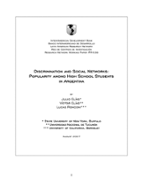Discrimination and Social Networks: Popularity among High School Students in Argentina
Date
Aug 2007
The objective of this paper is to better understand peer popularity during adolescence and detect discrimination. The paper subsequently explores how student's characteristics affect their popularity. It is found that physically attractive students and with high academic performance are highly ranked by their peers, but the former effect is only significant in mixed schools, suggesting that is primarily driven by mating. Other traits, such as skin color, nationality and parental socioeconomic background do not affect peer popularity, although ethnic origin and parental education are statistically significant in some specifications. The findings are informative about discrimination in the school system. In particular, it appears that the unequal treatment based on race, wealth and nationality found in other social environments in Argentina is not observed among adolescents attending school.



